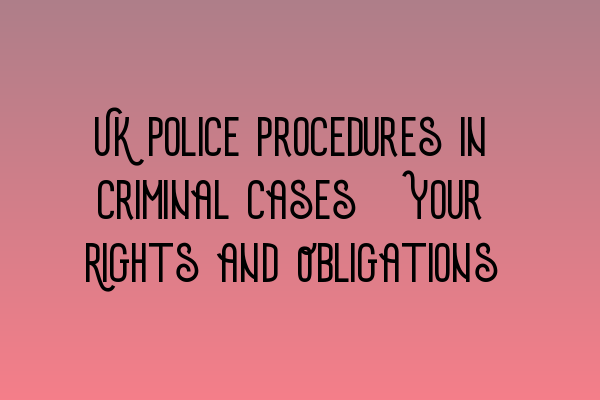UK Police Procedures in Criminal Cases: Your Rights and Obligations
If you find yourself involved in a criminal case in the UK, it is important to understand your rights and obligations when it comes to dealing with the police. The criminal justice system in the UK operates under specific procedures to safeguard the rights of both the accused and the victims. In this article, we will outline the key aspects of UK police procedures and provide information on the rights and obligations you have throughout the process.
Arrest and Detention
If you are arrested by the police in the UK, it is crucial to be aware of your rights. The police can only arrest you if they have reasonable grounds to believe that you have committed an offense. They must inform you of the reason for your arrest and caution you before questioning. You have the right to remain silent and seek legal advice or representation from a qualified criminal defense solicitor. Without proper legal representation, you may unknowingly waive your rights or provide self-incriminating statements.
If you require legal representation for your criminal case, it is advisable to consult with a professional criminal defense solicitor from SQE Criminal Law & Practice Law UK. Their expertise in UK criminal law will ensure that your rights are protected, and all legal procedures are followed accordingly. To learn more about legal representation, click here.
Questioning and Interview
During questioning, the police will conduct an interview to gather evidence and elicit information regarding the alleged offense. It is essential to remember that you have the right to remain silent and avoid self-incrimination. Anything you say during the interview can be used as evidence against you in court. It is recommended to have legal representation present during any police interview to ensure your rights are protected and to provide valuable guidance on how to respond to questions.
Investigation and Evidence Gathering
The police will conduct an investigation into the alleged offense, which may involve gathering evidence from various sources. This can include interviewing witnesses, collecting physical evidence, reviewing CCTV footage, and conducting forensic analysis. It is important to note that the police must follow proper protocols and guidelines when collecting evidence to maintain its integrity.
To understand the intricacies of the British legal system and gain insights into UK criminal law, we recommend reading the article on UK Criminal Law: An In-Depth Analysis of the British Legal System.
Charges and Bail
If the police consider there is enough evidence to pursue charges against you, they will either release you on bail or detain you pending further investigation or a court hearing. Bail allows you to remain free while awaiting trial, provided you comply with certain conditions. If you are denied bail, it is crucial to seek legal advice to understand the reasons and explore potential ways to secure your release.
Court Proceedings
Upon being charged, your case will proceed to court. It is essential to have proper legal representation throughout the court proceedings to ensure your rights are protected and to present a strong defense. SQE Criminal Law & Practice Law UK can provide expert legal advice and represent you in court. They have extensive experience in handling criminal cases and can guide you through the complex legal process.
If you are a UK business facing legal challenges in the U.S., the article on Legal Challenges for UK Businesses in the U.S.: Strategies for Overcoming Hurdles may provide valuable insights and suggestions to overcome such hurdles.
Conclusion
Understanding your rights and obligations during UK police procedures in criminal cases is essential to ensure a fair and just legal process. Seek legal advice from a qualified criminal defense solicitor to protect your rights, maintain your innocence, and navigate through the complex criminal justice system. Remember, knowledge is power, and being well-informed can make a significant difference in the outcome of your case.
